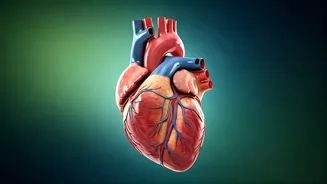Dietary Fiber Power
Fiber, especially soluble fiber, is a crucial element in your diet to help manage cholesterol. Consuming foods rich in soluble fiber, such as oats, beans,
apples, and citrus fruits, can substantially reduce LDL (bad) cholesterol levels. These fibers bind with cholesterol in the digestive system, preventing its absorption into the bloodstream. Include a serving of oatmeal in your breakfast to start your day, or add a handful of beans to your lunch salad. Regularly incorporating these fiber-rich options into your meals provides a sustained approach for cholesterol management. The recommended daily intake of soluble fiber is about 5 to 10 grams to see visible benefits.
Embrace Healthy Fats
Switching from saturated and trans fats to healthier fats is another effective strategy. Unsaturated fats, found in avocados, nuts, olive oil, and fatty fish (like salmon), can help lower LDL cholesterol and boost HDL (good) cholesterol. Replace butter and processed foods high in saturated fats with olive oil when cooking. Snack on a small handful of almonds instead of potato chips. Incorporating these healthier alternatives not only assists in lowering cholesterol but also contributes to overall cardiovascular health. Aim for a balanced intake, as all fats have a high-calorie content; moderating intake is still key for weight management.
Regular Physical Activity
Engaging in regular physical activity is a cornerstone of cholesterol management. Aim for at least 30 minutes of moderate-intensity exercise most days of the week. This can include brisk walking, jogging, cycling, or swimming. Exercise elevates HDL cholesterol levels, which helps clear LDL cholesterol from the arteries. It also aids in weight management, another factor that impacts cholesterol. Find activities you enjoy to ensure long-term consistency. Consider integrating exercise into your daily routine, such as taking the stairs instead of the elevator, or walking during your lunch break.
Quit Smoking Immediately
Smoking is detrimental to your overall health and significantly impacts cholesterol levels. It lowers HDL cholesterol and damages blood vessels, increasing the risk of cholesterol buildup. Quitting smoking is one of the most impactful changes you can make to improve your cholesterol profile and cardiovascular health. Various resources are available to help you quit, including counseling, medication, and support groups. The positive effects of quitting smoking are almost immediate, with improvements in cholesterol levels and cardiovascular health starting to show within weeks of stopping.
Limit Alcohol Intake
Excessive alcohol consumption can lead to increased cholesterol levels. While moderate alcohol intake might have some benefits, excessive amounts can raise LDL cholesterol and triglycerides. If you choose to drink alcohol, do so in moderation. This means up to one drink per day for women and up to two drinks per day for men. Focusing on healthy lifestyle choices, such as a balanced diet and regular exercise, is more beneficial in improving overall health and managing cholesterol. Consult with your healthcare provider for personalized advice.
Monitor and Manage Weight
Maintaining a healthy weight is directly linked to cholesterol levels. Being overweight or obese tends to elevate LDL cholesterol and lower HDL cholesterol. Even modest weight loss can result in significant improvements in your cholesterol profile. Implementing a balanced diet, regular exercise, and portion control can help you achieve and maintain a healthy weight. Tracking your progress and seeking professional advice from a doctor or a registered dietitian is useful in achieving your health goals. Focusing on long-term sustainable changes to your lifestyle, such as making healthy food choices, rather than relying on drastic methods, is key for managing your cholesterol and overall well-being.













